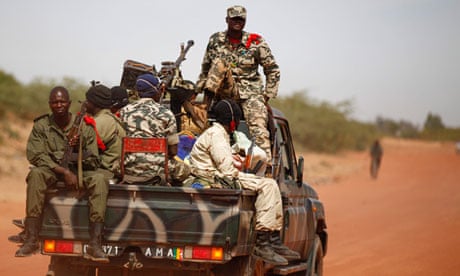François Hollande will pay a triumphant visit to Mali on Saturday to congratulate French troops who have succeeded in routing Islamist rebels from the north of the country in a whirlwind three weeks of fighting.
The French president, accompanied by his defence, foreign and development ministers, will visit the capital, Bamako, before flying to the Saharan desert town of Timbuktu, recently freed from sharia law by the arrival of French and Malian soldiers.
Hollande's visit is designed to play to his domestic audience and show that his high-risk decision to intervene in the former colony has paid off. The French military will whisk TV crews to Timbuktu to record the occasion.
Until just over a week ago, fighters from AQIM (al-Qaida in the Islamic Maghreb) controlled Timbuktu, torching its showpiece library of ancient manuscripts in a vengeful departing act. They retreated from the town without firing a shot.
Malians have overwhelmingly welcomed France's military operation, which involved 3,700 troops on the ground. Their own unelected leaders failed to stop a rebel advance last year, which meant the towns of Gao, Timbuktu and Kidal fell under Islamist rule. French, Malian and other African forces have retaken all three.
But with the major phase of Paris's campaign over, there is uncertainty about what comes next: a lasting peace or, as seems more probable, a simmering guerrilla war. There are also questions about the human rights record of Mali's army: Amnesty and Human Rights Watch accused the military on Friday in separate reports of carrying out extra-judicial killings.
Some Malians, meanwhile, are unhappy about negotiations in Kidal between French forces and the MNLA, a secular Tuareg nationalist militia that has been fighting in the south for decades. The MNLA wants an independent republic – something Dioncounda Traoré, Mali's interim president, has categorically ruled out.
Hollande's meeting with the unelected Traoré is likely to be brief. Traoré got the job after low-ranking army officers toppled the previous democratic president in a coup in March. Amid pressure from western countries, he has announced elections this summer.
France's defence minister, Jean-Yves Le Drian, has declared the intervention a success, while recognising that Mali's situation is not secure. He also said Malians must now establish a "reconciliation process". But this call has left some unhappy. "I welcome the French. But I'm extremely angry they are talking to the MNLA," Ibrahim al-Senussi, a corporal in Mali's army, said. "The MNLA are liars and traitors."
The fate of several French hostages held by Islamist groups is likely to feature in any private dialogue between Paris and northern Malian leaders. Some 11 westerners are being held by jihadist forces, it is believed, including three tourists who were kidnapped from their hotel in Timbuktu in 2011. A German who resisted was shot dead.
There has been no information on the hostages. But the remote mountains north of Kidal have previously been a haven for radical Islamist guerrillas. French fighter jets bombed the area on Thursday.
An Elysée diplomatic source said Hollande's visit was to "express his support and gratitude" to French and African troops. But bringing Pascal Canfin, the French development minister, one of only two Green party members in the Socialist-led government, is calculated to show that the trip is not just about military operations, but longer-term reconstruction.
Most of the French public back the intervention in Mali, even if it is not their top concern. A BVA poll this week suggested Hollande's swift decision to deploy troops had boosted his presidential stature and approval ratings slightly. But pollsters said despite a small bounce in ratings, Hollande's status remained "fragile" – the president is unpopular because of high unemployment and the economic crisis.
This week he said French and African forces in Mali were "winning the battle", but the joint African force taking over must continue the pursuit of Islamists in the north. France is due to hand over to a UN-backed African force of some 8,000 soldiers gradually, : its job will be to secure northern towns and pursue militants into their mountain redoubts near Algeria's border, but timings remain unclear.
